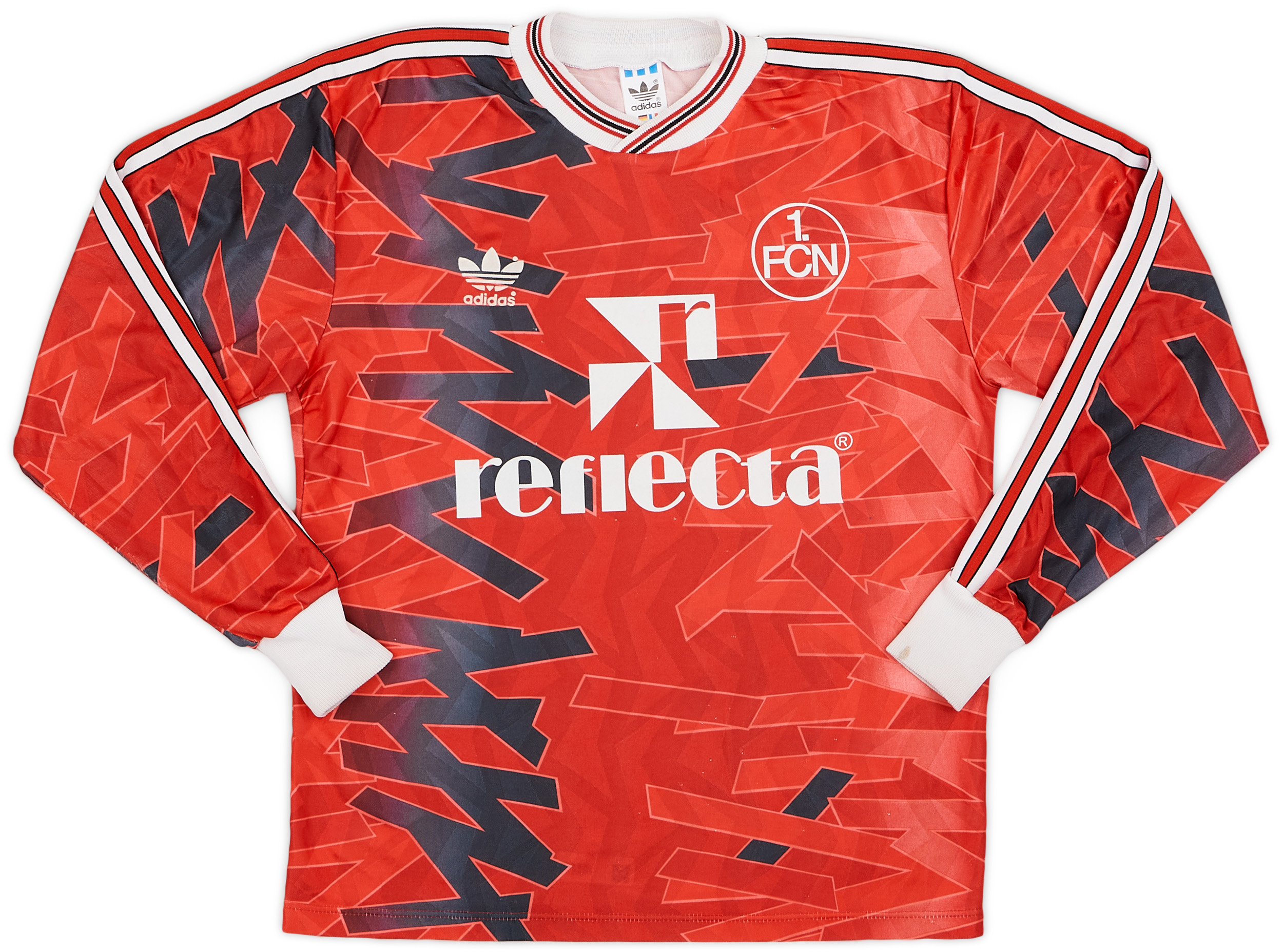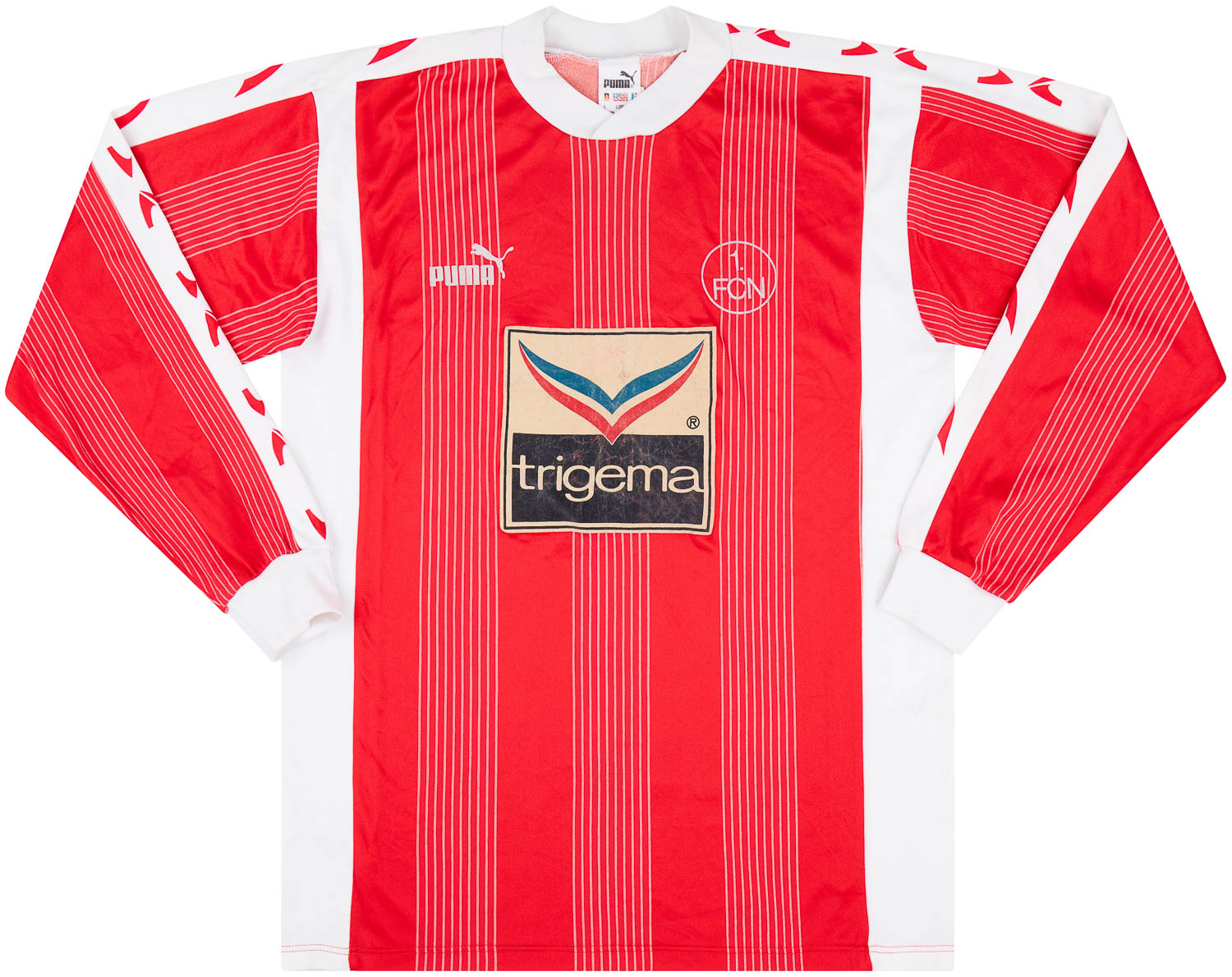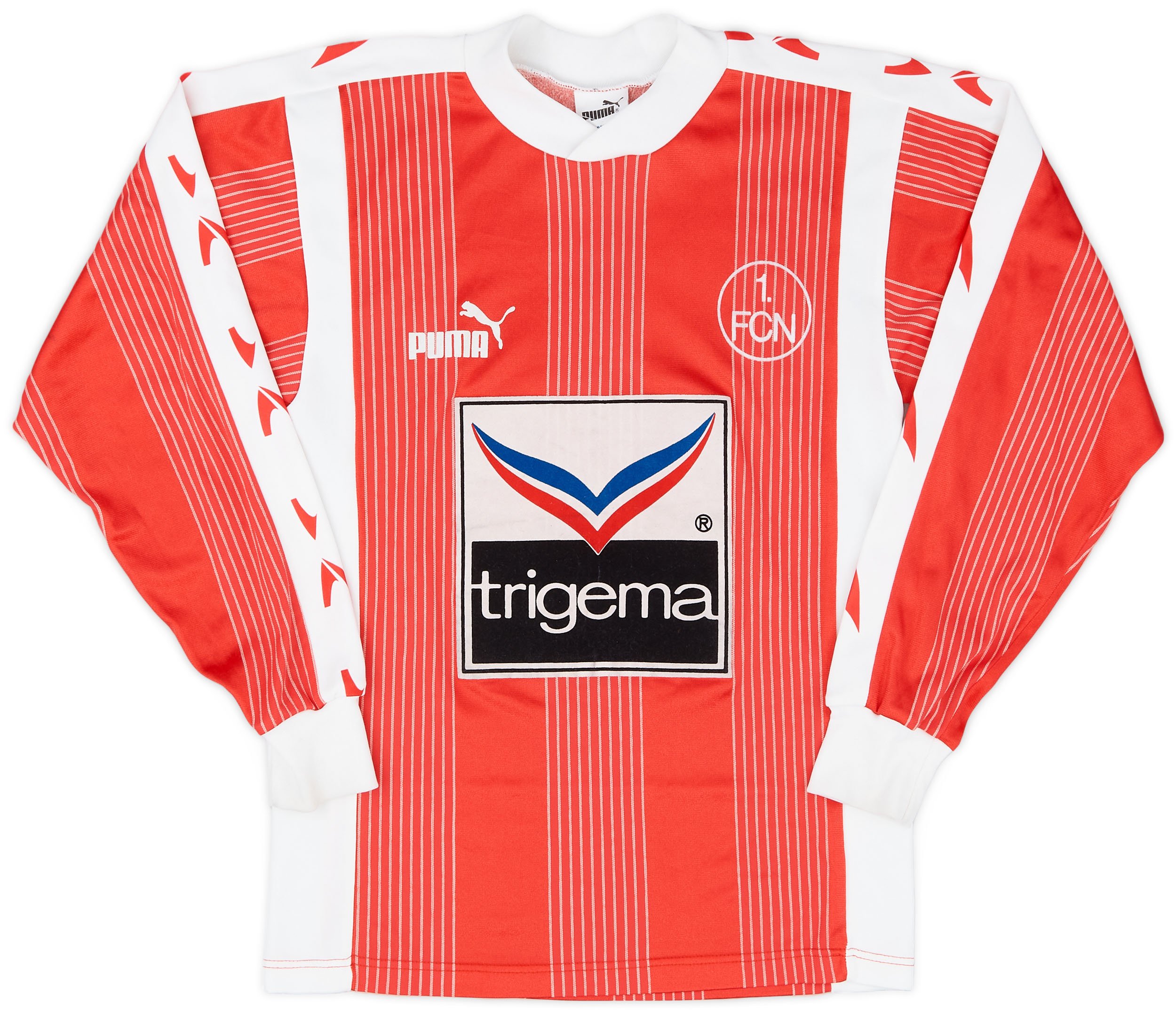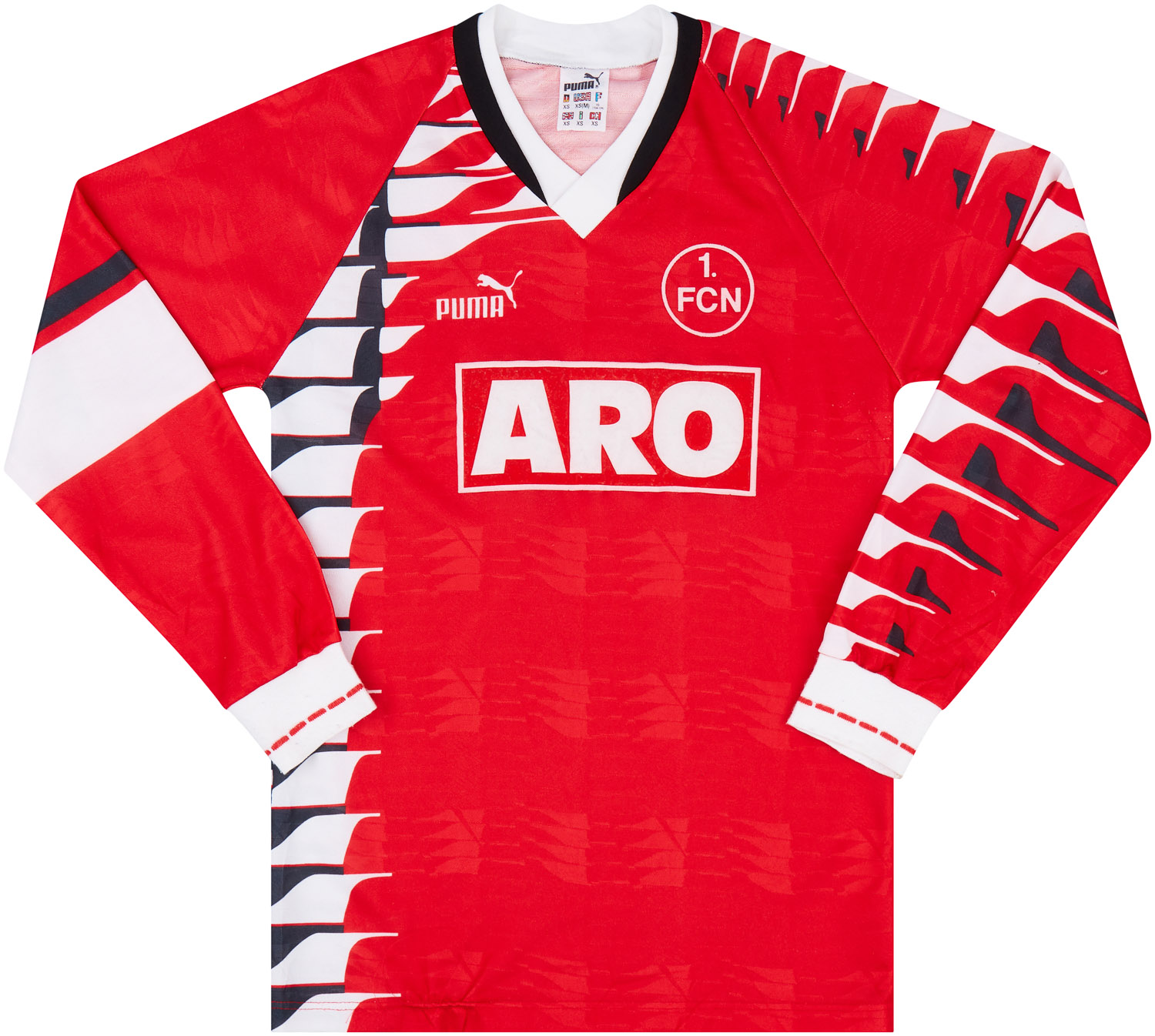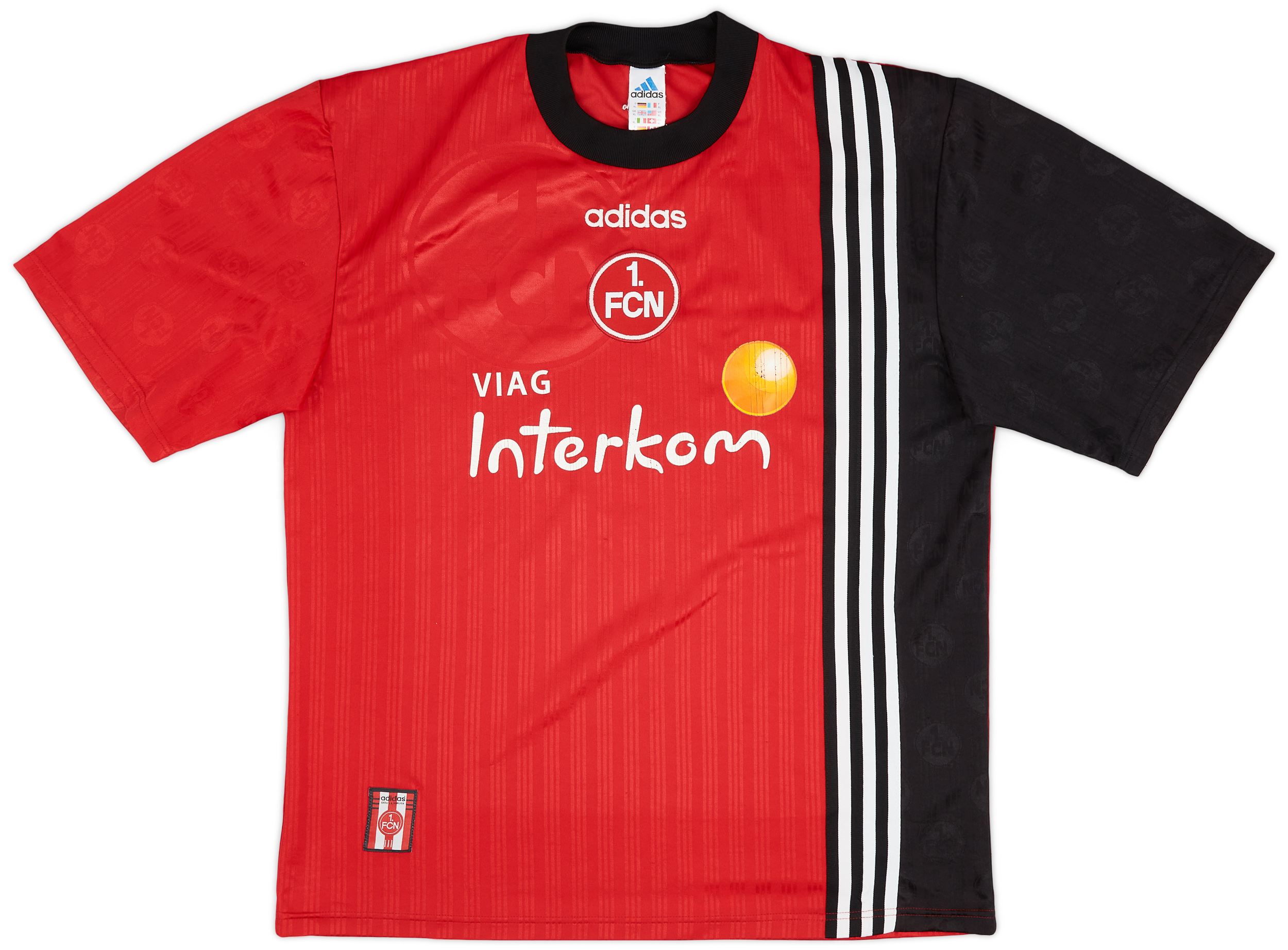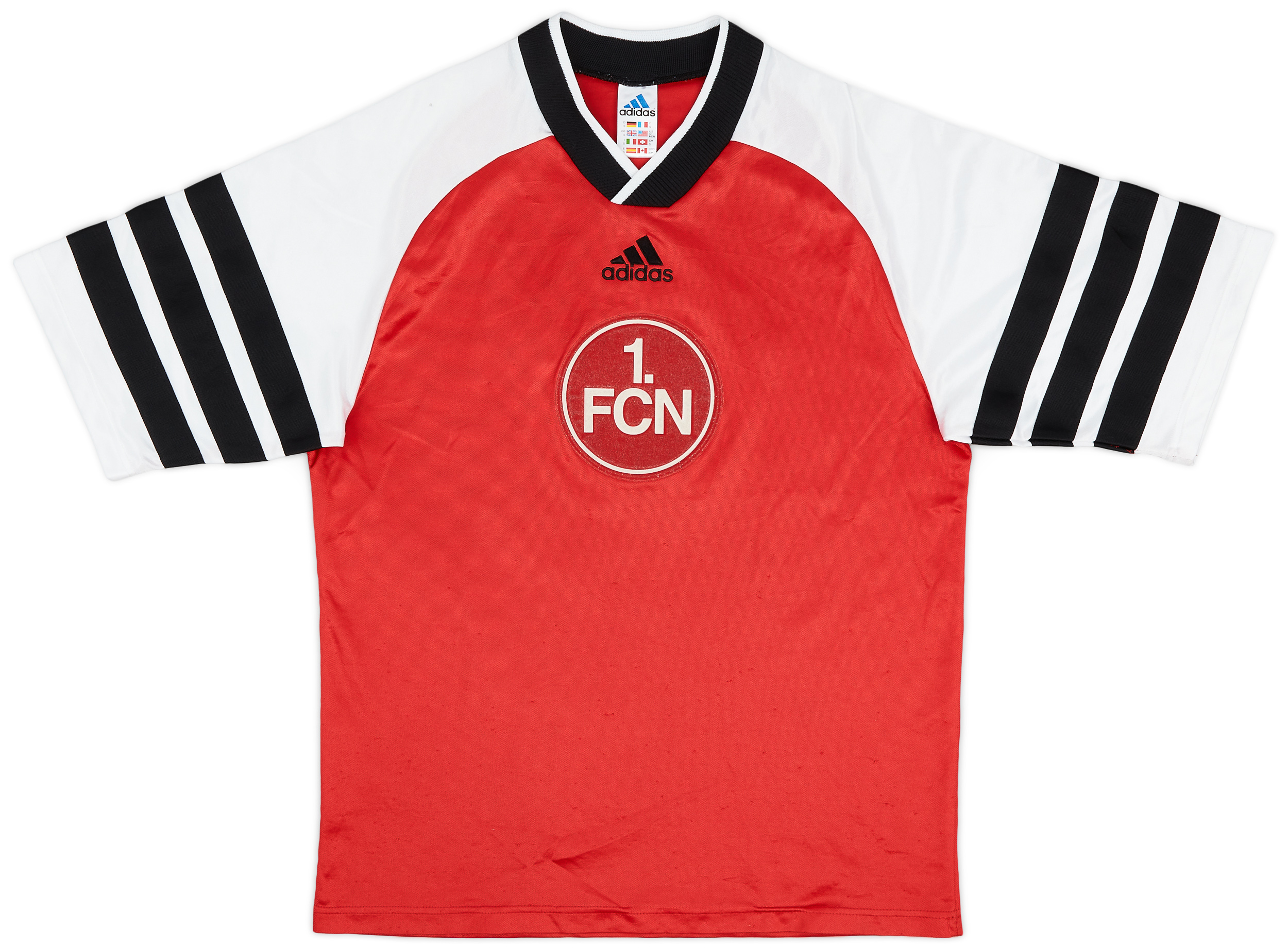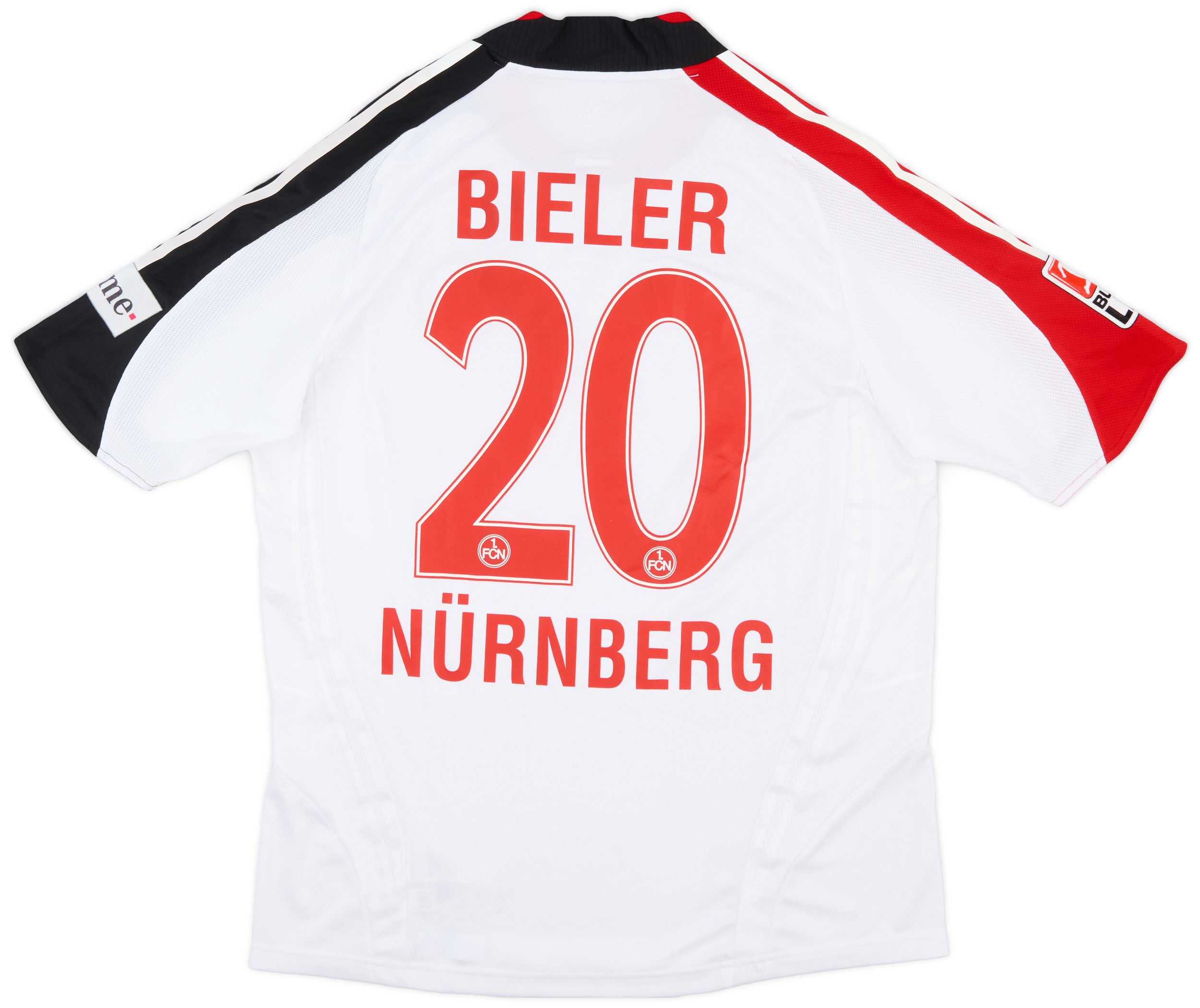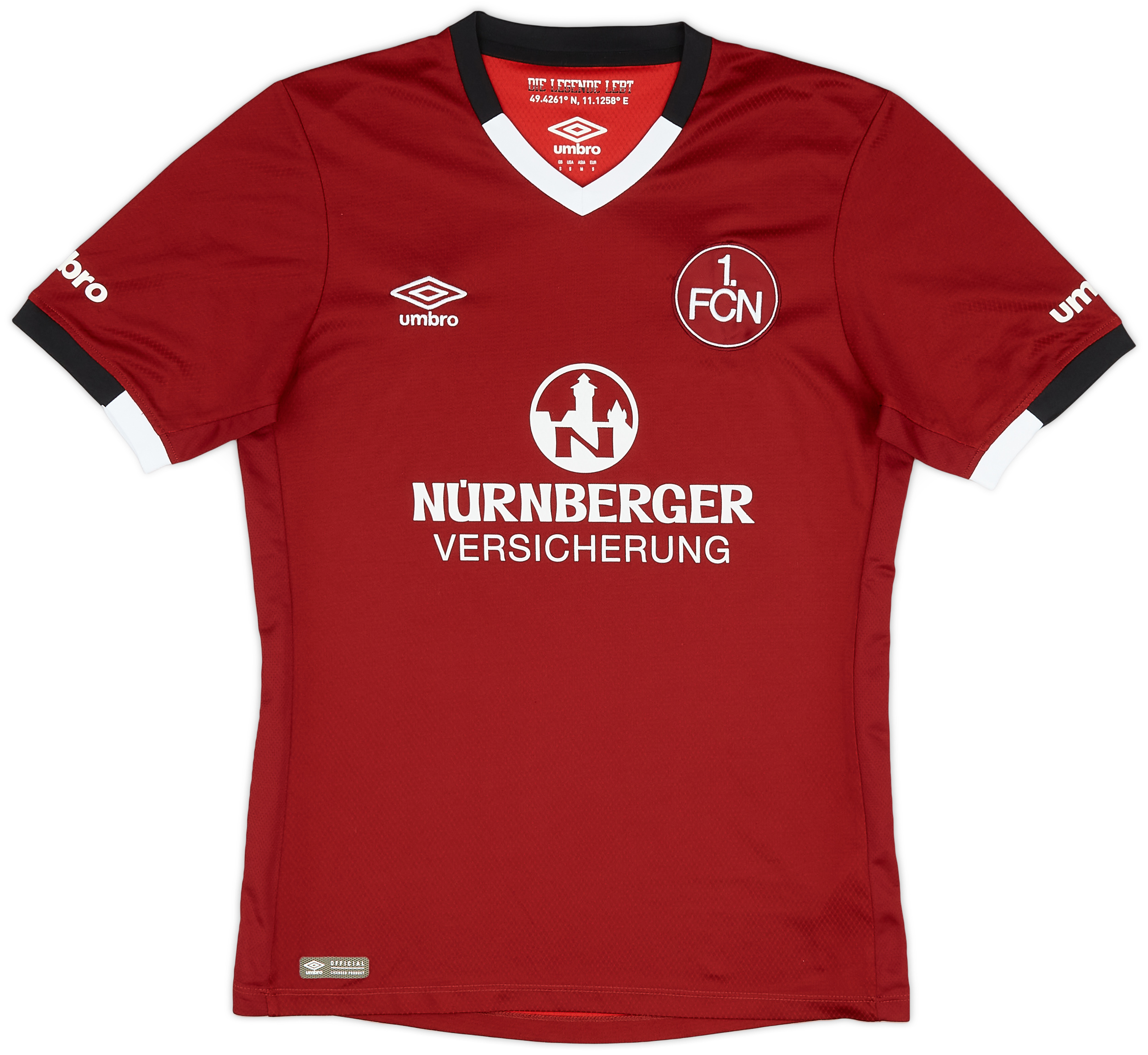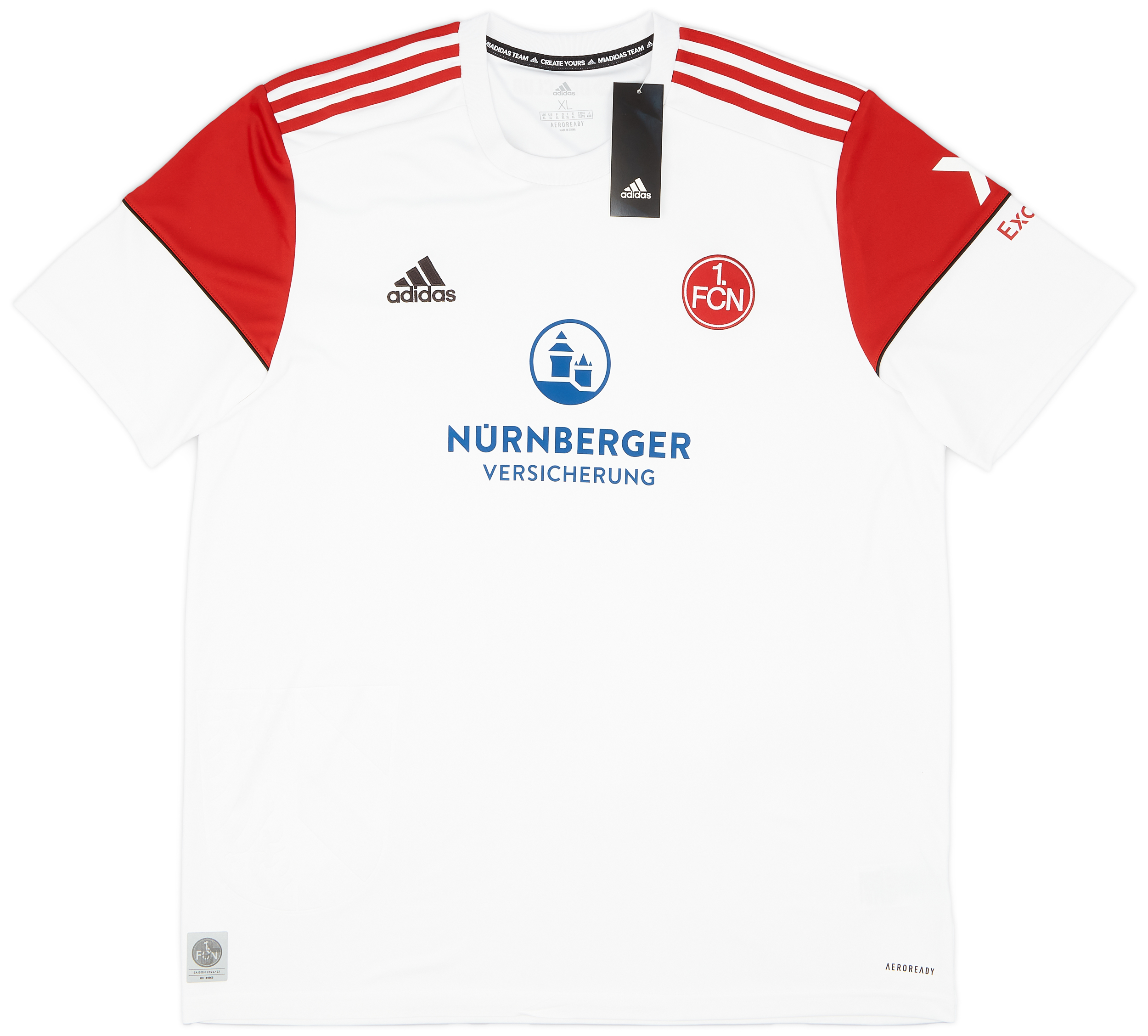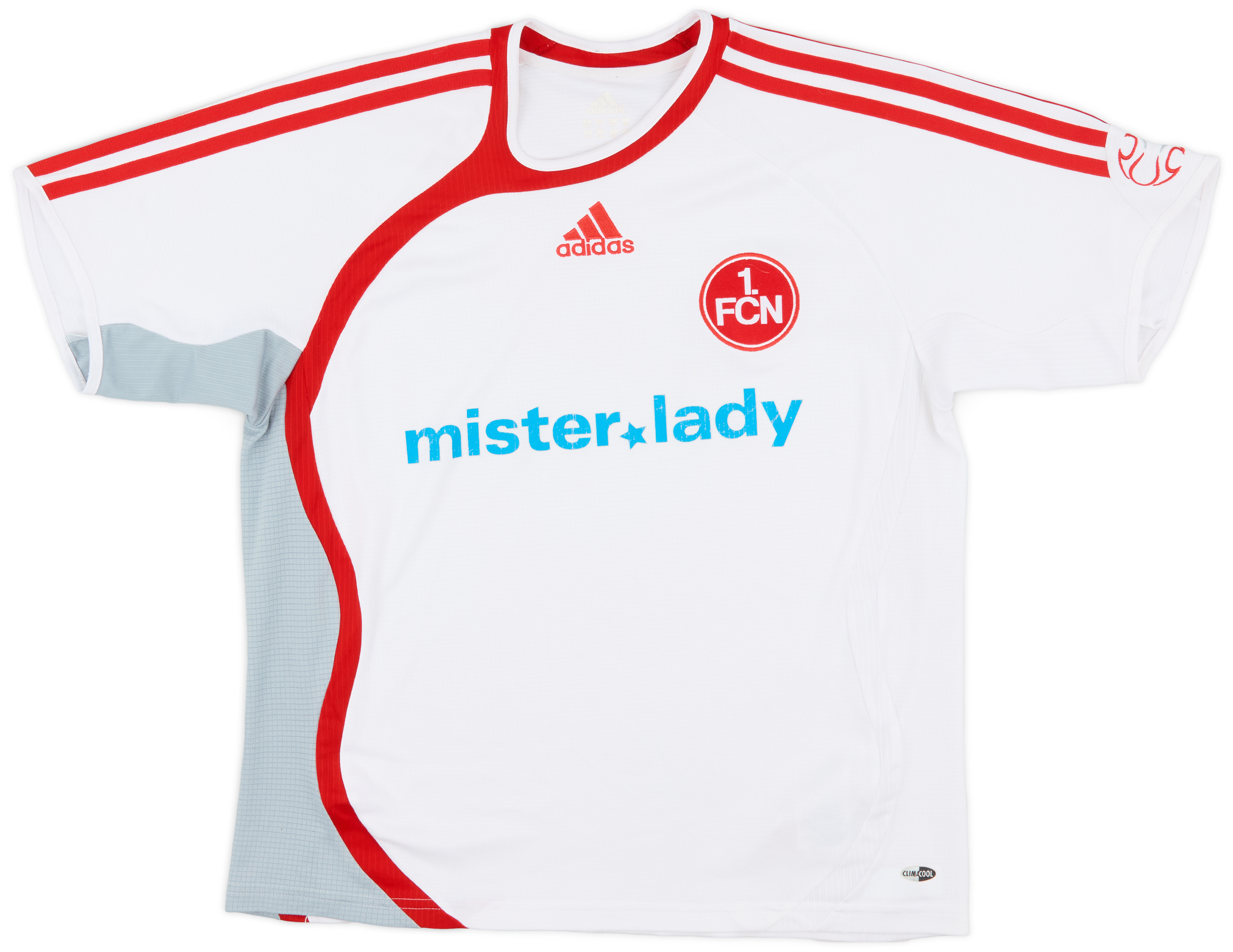Nurnberg
Introduction 1. FC Nürnberg, commonly known as Nürnberg, is a storied football club based in the historic city of Nuremberg, Germany. Founded in 1900, Nürnberg has deep roots in German football culture and tradition. Known affectionately as “Die Glubb” by their dedicated fanbase, this club has woven itself into the fabric of the local community, […]
1992-93 Nurnberg Home L/S Shirt - 8/10 - (S)
296.99£ - ca: €350
1994-95 Nurnberg Home Shirt - 9/10 - (XL)
177.99£ - ca: €210
1994-95 Nurnberg Home L/S Shirt - 9/10 - (L)
177.99£ - ca: €210
1993-94 Nurnberg Home L/S Shirt - 7/10 - (XL)
148.99£ - ca: €176
1995-96 Nurnberg Home L/S Shirt - 9/10 - (XS)
148.99£ - ca: €176
1995-96 Nurnberg Home Shirt #25 - 9/10 - (XL)
148.99£ - ca: €176
1993-94 Nurnberg Home L/S Shirt - 6/10 - (S)
148.99£ - ca: €176
1992-93 Nurnberg Home Shirt #9 - 7/10 - (S)
148.99£ - ca: €176
1993-94 Nurnberg Home L/S Shirt - 8/10 - (XXS)
118.99£ - ca: €140
1997-98 Nurnberg Home Shirt - 8/10 - (XXL)
118.99£ - ca: €140
2000-01 Nurnberg Player Issue Home L/S Shirt - 9/10 - (XL)
118.99£ - ca: €140
1993-94 Nurnberg Home Shirt - 6/10 - (L)
118.99£ - ca: €140
1997-98 Nurnberg Home Shirt - 8/10 - (XL)
118.99£ - ca: €140
1994-95 Nurnberg Home L/S Shirt - 8/10 - (XS)
118.99£ - ca: €140
1997-98 Nurnberg Home Shirt - 8/10 - (S)
106.99£ - ca: €126
1997-98 Nurnberg Home Shirt - 7/10 - (XXL)
94.99£ - ca: €112
1998-99 Nurnberg Away Shirt - 7/10 - (XL)
94.99£ - ca: €112
2008-09 Nurnberg Player Issue Away L/S Shirt - 8/10 - (S)
94.99£ - ca: €112
1999-00 Nurnberg Away Shirt - 7/10 - (S)
94.99£ - ca: €112
1998-99 Nurnberg Away Shirt - 7/10 - (XL)
94.99£ - ca: €112
1997-98 Nurnberg Home Shirt - 6/10 - (XL)
94.99£ - ca: €112
1998-99 Nurnberg Away Shirt - 7/10 - (S)
94.99£ - ca: €112
1996-98 Nurnberg adidas Training Shirt - 9/10 - (S)
82.99£ - ca: €98
2002-03 Nurnberg Home Shirt - 9/10 - (S)
82.99£ - ca: €98
2001-02 Nurnberg Home Shirt - 9/10 - (M)
82.99£ - ca: €98
2002-03 Nurnberg Away Shirt - 8/10 - (XXL)
82.99£ - ca: €98
2008-09 Nurnberg Player Issue Away L/S Shirt - 6/10 - (XL)
82.99£ - ca: €98
2002-03 Nurnberg Away Shirt - 8/10 - (L)
82.99£ - ca: €98
2002-03 Nurnberg Away Shirt - 8/10 - (L)
82.99£ - ca: €98
2000-02 Nurnberg Away Shirt - 6/10 - (XL)
70.99£ - ca: €84
2005-06 Nurnberg Home Shirt - 6/10 - (L)
70.99£ - ca: €84
1998-99 Nurnberg adidas Training Shirt - 8/10 - (S)
70.99£ - ca: €84
2008-09 Nurnberg Away Shirt Bieler #20 - 8/10 - (L)
70.99£ - ca: €84
2001-02 Nurnberg Home Shirt - 7/10 - (XL)
70.99£ - ca: €84
2002-03 Nurnberg Away Shirt - 7/10 - (M)
70.99£ - ca: €84
2002-03 Nurnberg Home Shirt - 7/10 - (XL)
70.99£ - ca: €84
2001-02 Nurnberg Home Shirt - 7/10 - (XL)
70.99£ - ca: €84
2004-05 Nurnberg Home Shirt - 9/10 - (L)
70.99£ - ca: €84
2012-13 Nurnberg adidas Track Jacket - 9/10 - (XL)
70.99£ - ca: €84
2007-08 Nurnberg Home Shirt Mintal #11 - 9/10 - (3XL)
70.99£ - ca: €84
2007-08 Nurnberg Home Shirt - 8/10 - (S)
58.99£ - ca: €70
1997-98 Nurnberg Home Shirt - 9/10 - (XL.Boys)
58.99£ - ca: €70
2007-08 Nurnberg Home Shirt - 9/10 - (XXL)
58.99£ - ca: €70
2007-08 Nurnberg Home Shirt - 8/10 - (XL)
58.99£ - ca: €70
2015-16 FC Nurnberg adidas 1/4 Zip Training Top - 7/10 - (M)
58.99£ - ca: €70
2007-08 Nurnberg Home Shirt - 8/10 - (S)
58.99£ - ca: €70
2015-16 Nurnberg Home Shirt Kerk #17 - 9/10 - (M)
58.99£ - ca: €70
1997-98 Nurnberg Home Shirt - 9/10 - (XL.Boys)
58.99£ - ca: €70
2018-19 Nurnberg Home Shirt Leibold #23 - 9/10 - (XL)
58.99£ - ca: €70
2008-09 Nurnberg Away Shirt - 8/10 - (M)
58.99£ - ca: €70
2003-04 Nurnberg Home Shirt - 6/10 - (S)
58.99£ - ca: €70
2007-08 Nurnberg Home Shirt - 8/10 - (M)
58.99£ - ca: €70
2003-04 Nurnberg Home Shirt - 6/10 - (M)
58.99£ - ca: €70
2007-08 Nurnberg Home Shirt - 8/10 - (M)
58.99£ - ca: €70
2004-05 Nurnberg Away Shirt - 6/10 - (XXL)
58.99£ - ca: €70
2007-08 Nurnberg Home Shirt - 9/10 - (S)
58.99£ - ca: €70
2011-12 Nurnberg Home Shirt - 6/10 - (S)
58.99£ - ca: €70
2019-20 Nurnberg Third Shirt - 10/10 - (XXL)
58.99£ - ca: €70
1997-98 Nurnberg Home Shirt - 6/10 - (XL.Boys)
53.99£ - ca: €64
2007-08 Nurnberg Home Shirt - 7/10 - (S)
53.99£ - ca: €64
1997-98 Nurnberg Home Shirt - 7/10 - (XL.Boys)
53.99£ - ca: €64
2016-17 Nurnberg Home Shirt - 9/10 - (S)
53.99£ - ca: €64
2021-22 Nurnberg Home Shirt Shuranov #11 - 8/10 - (S)
53.99£ - ca: €64
2010-12 Nurnberg Away Shirt - 6/10 - (S)
53.99£ - ca: €64
2008-09 Nurnberg Home Shirt - 6/10 - (XL)
47.99£ - ca: €57
2022-23 Nurnberg Away Shirt
47.99£ - ca: €57
2008-09 Nurnberg Home Shirt - 6/10 - (XXL)
47.99£ - ca: €57
2012-13 Nurnberg Away Shirt - 7/10 - (XXL)
47.99£ - ca: €57
2007-08 Nurnberg Home Shirt - 6/10 - (S)
47.99£ - ca: €57
2008-09 Nurnberg Home Shirt - 8/10 - (L)
47.99£ - ca: €57
2008-09 Nurnberg Home Shirt - 8/10 - (L)
47.99£ - ca: €57
2020-21 Nurnberg Third Shirt - 9/10 - (S)
41.99£ - ca: €50
2013-14 Nurnberg Home Shirt - 7/10 - (S)
41.99£ - ca: €50
2020-21 Nurnberg Umbro Hooded Track Jacket - 8/10 - (M)
41.99£ - ca: €50
2001-02 Nurnberg Home Shirt Ciric #29 - 8/10 - (M)
41.99£ - ca: €50
2014-15 Nurnberg adidas 1/4 Zip Drill Top - 8/10 - (XL.Boys)
41.99£ - ca: €50
2008-09 Nurnberg Home Shirt - 6/10 - (S)
41.99£ - ca: €50
2008-09 Nurnberg Home Shirt - 7/10 - (XXL)
41.99£ - ca: €50
2020-21 Nurnberg adidas Track Jacket - 9/10 - (M)
41.99£ - ca: €50
2009-11 Nurnberg Home Shirt - 7/10 - (XL.Boys)
35.99£ - ca: €42
2007-08 Nurnberg adidas Training Shirt - 9/10 - (XL.Boys)
35.99£ - ca: €42
1999-00 Nurnberg Home Shirt - 8/10 - (XL.Boys)
35.99£ - ca: €42
2007-08 Nurnberg Basic Home Shirt - 9/10 - (XL)
35.99£ - ca: €42
2009-10 Nurnberg Away Shirt - 8/10 - (XL.Boys)
35.99£ - ca: €42
2011-12 Nurnberg Home Shirt - 5/10 - (S)
29.99£ - ca: €35
2007-08 Nurnberg Home Shirt - 8/10 - (XL.Boys)
29.99£ - ca: €35
2007-08 Nurnberg Home Shirt - 8/10 - (XL.Boys)
29.99£ - ca: €35
2012-13 Nurnberg Home Shirt - 8/10 - (XL.Boys)
29.99£ - ca: €35
2008-09 Nurnberg Home Shirt - 5/10 - (S)
29.99£ - ca: €35
2007-08 Nurnberg adidas Training Shirt #5 - 6/10 - (XL)
29.99£ - ca: €35
2016-17 Nurnberg Home Shirt - 5/10 - (S)
29.99£ - ca: €35
2012-13 Nurnberg adidas Polo Shirt - 9/10 - (M)
29.99£ - ca: €35
2017-18 Nurnberg Home Shirt Behrens #18 - 9/10 - (XL.Boys)
29.99£ - ca: €35
2013-14 Nurnberg GK Shirt - 8/10 - (XL.Boys)
29.99£ - ca: €35
2013-14 Nurnberg Home Shirt - 5/10 - (M)
23.99£ - ca: €28
2009-11 Nurnberg Home Shirt - 8/10 - (M.Boys)
23.99£ - ca: €28
1997-98 Nurnberg Home Shirt Sergio #1 - 5/10 - (XL.Boys)
23.99£ - ca: €28
2008-09 Nurnberg Away Shirt - 8/10 - (L.Boys)
23.99£ - ca: €28
2009-11 Nurnberg Home Shirt - 4/10 - (S)
23.99£ - ca: €28
2007-08 Nurnberg Home Shirt - 7/10 - (M.Boys)
17.99£ - ca: €21
2006-07 Nurnberg Away Shirt - 7/10 - (L.Boys)
17.99£ - ca: €21
2020s Nurnberg Fan Group Sweater - 8/10 - (M)
17.99£ - ca: €21
2008-09 Nurnberg Home Shirt - 3/10 - (XL.Boys)
11.99£ - ca: €14
2016-17 Zabo Eintracht Nurnberg Graphic Tee - 5/10 - (XS)
11.99£ - ca: €14
2007-08 Nurnberg adidas Training Shirt - 4/10 - (XL)
11.99£ - ca: €14
2012-13 Nurnberg Away Shirt - 4/10 - (S)
11.99£ - ca: €14
Introduction
1. FC Nürnberg, commonly known as Nürnberg, is a storied football club based in the historic city of Nuremberg, Germany. Founded in 1900, Nürnberg has deep roots in German football culture and tradition. Known affectionately as “Die Glubb” by their dedicated fanbase, this club has woven itself into the fabric of the local community, fostering a passionate following that transcends generations. From thrilling victories to heartbreaking defeats, the club’s journey through various tiers of German football highlights its resilience and unwavering spirit.
Club History
The history of 1. FC Nürnberg begins at the turn of the 20th century. Formed on May 14, 1900, the club was created by a group of enthusiastic footballers looking to promote the sport in Nuremberg. The early years saw the club playing in regional leagues, but it quickly rose through the ranks of German football. In 1920, Nürnberg won its first major trophy, capturing the German championship, which laid the foundation for future successes.
The club’s golden era came in the 1920s and 1930s when they dominated German football, becoming a powerhouse in the National League. Nürnberg won the German Championship a total of nine times, their last title coming in the 1960-61 season. However, the post-World War II years weren’t as kind, with the club experiencing relegation to lower leagues. Despite these challenges, Nürnberg’s loyal supporters stood by their team, and the club remained a significant part of the local identity.
Achievements
The club also has a European presence, reaching the semi-finals of the European Cup (now known as the UEFA Champions League) during the 1980-81 season. Although they have not been as prominent on the European stage in recent years, their historical performances continue to hold significance for the club and its supporters.
Significant Players and Matches
Nürnberg has been home to many legendary players who have left an indelible mark on the club’s history. Among them is Max Morlock, a prominent figure in the 1950s who not only played for the club but also represented West Germany in the 1954 FIFA World Cup, where they emerged victorious. Another notable player is Marek Mintál, the Czech forward who became the league’s top scorer during the 2006-07 season, and played a pivotal role in Nürnberg’s 2007 DFB-Pokal victory.
One of the most significant matches in the club’s history took place in 1982 when they clinched the DFB-Pokal title, a moment celebrated by fans for years. The match against VfB Stuttgart ended in a dramatic penalty shootout, showcasing the club’s tenacity and courage under pressure. Similarly, their 2007 cup final victory against VfB Stuttgart marked a return to glory, as they triumphed 3-2, etching that season into the annals of the club’s legacy.
Cultural Impact
The impact of 1. FC Nürnberg extends beyond the football field. The club has become an integral part of the community, representing not just sporting excellence but also local pride and identity. The iconic Max-Morlock-Stadion, named after the aforementioned player, serves as a gathering place for thousands of fans who share a deep connection with the club. The stadium provides an electric atmosphere on match days, filled with chants and colors that reflect the unwavering support of the “Club” family.
Nürnberg’s fanbase is renowned for its loyalty and passion. Even during challenging seasons, supporters flock to matches, demonstrating their unwavering commitment. This culture of togetherness not only reinforces the idea of unity but also inspires the next generation of footballers and fans, ensuring that the legacy of 1. FC Nürnberg continues.
Conclusion
1. FC Nürnberg holds a distinguished place in the annals of German football history. With its rich heritage, remarkable achievements, and passionate fanbase, the club remains a symbol of resilience and tradition. From its early successes in the 1920s to contemporary challenges, Nürnberg’s story is one of perseverance, pride, and community spirit. As the club continues to navigate its journey in the modern football landscape, “Die Glubb” remains a beacon of hope and ambition for its supporters, promising to uphold the values and legacy that have defined it for over a century.
